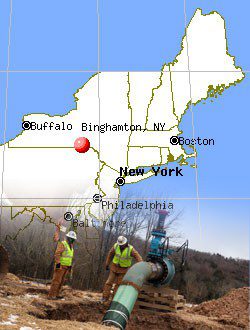
A group of five landowners is challenging one New York state community’s ban of hydraulic fracturing (fracking) drilling. According to a Reuters report, the landowners believe the Binghamton, N.Y., city council and Mayor acted against proper protocol when voting to ban fracking drilling the the city. Instead, they feel the city should have consulted with […]
 A group of five landowners is challenging one New York state community’s ban of hydraulic fracturing (fracking) drilling.
A group of five landowners is challenging one New York state community’s ban of hydraulic fracturing (fracking) drilling.
According to a Reuters report, the landowners believe the Binghamton, N.Y., city council and Mayor acted against proper protocol when voting to ban fracking drilling the the city. Instead, they feel the city should have consulted with the Broome County Planning Commission before approving the ban
The ban on fracking activity in Binghamton was passed as a means of countering somewhat lax state and federal regulations concerning fracking drilling. Other local drilling bans in New York state have already been upheld by higher court judges but these five landowners recently filed a new lawsuit seeking to have their town’s ban overturned. The lawsuit suggests the Binghamton officials broke proper protocol in passing the ban and believe they’ve left the city short in economic development terms.
The five landowners filing the lawsuit against the city officials are two individuals, two landowner groups, and the owners of a hotel who believe allowing fracking drilling in Binghamton could spur some progress in the region.
Binghamton, like many locations in the Mid Atlantic region, sits atop a piece of the massive Marcellus shale formation that’s thought to contain billions of dollars in natural gas reserves. As gas drilling has expanded and thousands of wells have been opened in just the last few years in the areas surrounding Binghamton, residents from New York, Pennsylvania, Ohio, Maryland, West Virginia, and New Jersey (in that region specifically) have raised concerns over the safety of fracking drilling.
While some believe fracking is an answer to a downturn economy and energy independence, more believe the drilling is putting the fresh water supplies for millions of people at risk. The risk is greater for those living closest to the drilling boom. Converse from this latest lawsuit, a number of residents from the region have recently sought legal action against drilling and natural gas companies they’re blaming for contaminating their land, water supply, and air, especially within a mile radius of an active well.
Fracking drilling involves injecting massive amounts of water, sand, a drill, and a mix of more than 600 chemicals underground via a concrete well that extends to an underground bed of shale rock. When this combination reaches the rock, it is blasted apart and natural gas is released and supposed to be returned to the surface and captured. Either through fault of the drilling company’s shoddy wells, poorly trained well workers, or through a questionable drilling process altogether, natural gas and the contents of the drilling fluid are being released underground through cracks in the wells or the fractures created by the drilling. This, many residents closest to wells believe, has led to a contamination of their private water supplies, in some cases rendering it completely contaminated.
New York state is currently mulling options regarding fracking drilling. The state appears willing to allow drilling to continue, at least in limited capacity, while some communities like Binghamton have taken to passing their own bans attempting to preempt any state or federal laws.


